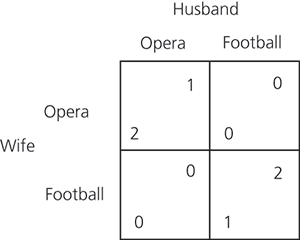A two-player game that illustrates the gains that can be obtained from coordination and the difficulties of achieving coordination. A typical description of the game involves a husband and a wife who must choose between spending an evening at the opera and an evening at a football match. The husband prefers football to opera and the wife opera to football. Both prefer to be together than to attend separate events. This information is summarized in the pay-off matrix.

The game has two Nash equilibria in pure strategies, {Opera, Opera} and {Football, Football}, and a mixed strategy equilibrium in which the players randomize between playing strategy {Opera} and strategy {Football}. The interesting feature of the game is that all the equilibria can be criticized. In the pure strategy equilibria one of the players receives a pay-off consistently lower than the other even though the underlying game is symmetric. In the mixed strategy equilibria there will be a positive probability that the players fail to attend the same event. The players can both gain if they adopt a random device (such as tossing a coin) to correlate their choices.
- call by reference
- call by value
- call detail reporting
- Calles, Plutarco Eliás (1877–1945)
- Callicles
- calliclone
- calling line identification
- calling sequence
- call instruction
- Callippus (c.370–c.300 bc)
- Callisto
- call money
- call option
- callose
- Callovian
- callus
- calm
- calmodulin
- calnexin
- calomel
- calomel half cell
- Calorian
- caloric theory
- Calorie
- calorie